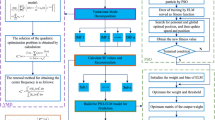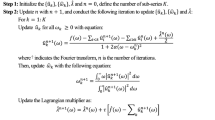Abstract
The open carbon trading market is an important means to reduce carbon emissions, develop a low-carbon economy, and promote environmental protection. Accurate carbon price projections have far-reaching implications for economic and environmental policymaking. In this paper, a new combination model of carbon price prediction is proposed, which can effectively improve the accuracy of prediction. First, adaptive variational mode decomposition (AVMD) was used to decompose the original carbon price sequence into several less complex intrinsic mode functions (IMF). Secondly, the partial autocorrelation function (PACF) is used to determine the input variables for each IMF forecasting model. Finally, the extreme learning machine (ELM) optimized by the dynamic adaptive inertial factor particle swarm optimization (DAIFPSO) algorithm was used for prediction. The proposed combination model is applied to the carbon price prediction of some carbon markets in China (Beijing, Guangdong, Hubei) and compared with the other 11 models. Finally, it is found that the model has the best performance. The results show that the model is effective and stable. Therefore, this model can be used as an effective tool for government and carbon market participants to predict carbon prices and provide a reference for their decision-making.













Similar content being viewed by others
Data availability
Not applicable.
References
Byun SJ, Cho H (2013) Forecasting carbon futures volatility using GARCH models with energy volatilities. Energy Econ 40:207–221. https://doi.org/10.1016/j.eneco.2013.06.017
Chen DB, Zhao CX (2009) Particle swarm optimization with adaptive population size and its application. Appl Soft Comput J 9:39–48. https://doi.org/10.1016/j.asoc.2008.03.001
Chen S, Wang JQ, Zhang HY (2019) A hybrid PSO-SVM model based on clustering algorithm for short-term atmospheric pollutant concentration forecasting. Technol Forecast Soc Change 146:41–54. https://doi.org/10.1016/j.techfore.2019.05.015
Di Cesare N, Chamoret D, Domaszewski M (2015) A new hybrid PSO algorithm based on a stochastic Markov chain model. Adv Eng Softw 90:127–137. https://doi.org/10.1016/j.advengsoft.2015.08.005
Du H, Song D, Chen Z et al (2020a) Prediction model oriented for landslide displacement with step-like curve by applying ensemble empirical mode decomposition and the PSO-ELM method. J Clean Prod 270:122248. https://doi.org/10.1016/j.jclepro.2020.122248
Du P, Wang J, Yang W, Niu T (2020b) Point and interval forecasting for metal prices based on variational mode decomposition and an optimized outlier-robust extreme learning machine. Resour Policy 69:101881. https://doi.org/10.1016/j.resourpol.2020.101881
García Nieto PJ, García-Gonzalo E, Sánchez Lasheras F, De Cos Juez FJ (2015) Hybrid PSO-SVM-based method for forecasting of the remaining useful life for aircraft engines and evaluation of its reliability. Reliab Eng Syst Saf 138:219–231. https://doi.org/10.1016/j.ress.2015.02.001
García-Martos C, Rodríguez J, Sánchez MJ (2013) Modelling and forecasting fossil fuels, CO2 and electricity prices and their volatilities. Appl Energy 101:363–375. https://doi.org/10.1016/j.apenergy.2012.03.046
Hasan N (2020) A Methodological approach for predicting COVID-19 epidemic using EEMD-ANN hybrid model. Internet Things 11:100228. https://doi.org/10.1016/j.iot.2020.100228
He K, Chen Y, Tso GKF (2018) Forecasting exchange rate using variational mode decomposition and entropy theory. Phys A Stat Mech Its Appl 510:15–25. https://doi.org/10.1016/j.physa.2018.05.135
Hu Y, Li J, Hong M et al (2019) Short term electric load forecasting model and its verification for process industrial enterprises based on hybrid GA-PSO-BPNN algorithm—A case study of papermaking process. Energy 170:1215–1227. https://doi.org/10.1016/j.energy.2018.12.208
Huang Y, He Z (2020) Carbon price forecasting with optimization prediction method based on unstructured combination. Sci Total Environ 725:138350. https://doi.org/10.1016/j.scitotenv.2020.138350
Jiang L, Wu P (2015) International carbon market price forecasting using an integration model based on SVR. 1081–1084 https://doi.org/10.2991/emeeit-15.2015.61
Jordehi AR (2015) Enhanced leader PSO (ELPSO): A new PSO variant for solving global optimisation problems. Appl Soft Comput J 26:401–417. https://doi.org/10.1016/j.asoc.2014.10.026
Li S, Liu X, Lin A (2020a) Fractional frequency hybrid model based on EEMD for financial time series forecasting. Commun Nonlinear Sci Numer Simul 89:105281. https://doi.org/10.1016/j.cnsns.2020.105281
Li ZP, Yang L, Zhou YN et al (2020b) Scenario simulation of the EU carbon price and its enlightenment to China. Sci Total Environ 723:137982. https://doi.org/10.1016/j.scitotenv.2020.137982
Ma X, Jiang P, Jiang Q (2020) Research and application of association rule algorithm and an optimized grey model in carbon emissions forecasting. Technol Forecast Soc Change 158:120159. https://doi.org/10.1016/j.techfore.2020.120159
Mensi W, Hammoudeh S, Shahzad SJH et al (2017) Oil and foreign exchange market tail dependence and risk spillovers for MENA, emerging and developed countries: VMD decomposition based copulas. Energy Econ 67:476–495. https://doi.org/10.1016/j.eneco.2017.08.036
Niu D, Wang K, Sun L et al (2020) Short-term photovoltaic power generation forecasting based on random forest feature selection and CEEMD: A case study. Appl Soft Comput J 93:106389. https://doi.org/10.1016/j.asoc.2020.106389
Shrivastava Y, Singh B (2019) A comparative study of EMD and EEMD approaches for identifying chatter frequency in CNC turning. Eur J Mech A/Solids 73:381–393. https://doi.org/10.1016/j.euromechsol.2018.10.004
Song Y, Liu T, Liang D et al (2019) A fuzzy stochastic model for carbon price prediction under the effect of demand-related policy in China’s carbon market. Ecol Econ 157:253–265. https://doi.org/10.1016/j.ecolecon.2018.10.001
Sun W, Huang C (2020) A carbon price prediction model based on secondary decomposition algorithm and optimized back propagation neural network. J Clean Prod 243:118671. https://doi.org/10.1016/j.jclepro.2019.118671
Sun W, Xu C (2021) Carbon price prediction based on modified wavelet least square support vector machine. Sci Total Environ 754:142052. https://doi.org/10.1016/j.scitotenv.2020.142052
Sun W, Zhang C (2018) Analysis and forecasting of the carbon price using multi—resolution singular value decomposition and extreme learning machine optimized by adaptive whale optimization algorithm. Appl Energy 231:1354–1371. https://doi.org/10.1016/j.apenergy.2018.09.118
Viswanath A, Jyotsna Jose K, Krishnan N et al (2015) Spike detection of disturbed power signal using VMD. Procedia Comput Sci 46:1087–1094. https://doi.org/10.1016/j.procs.2015.01.021
Wu Q (2010) Power load forecasts based on hybrid PSO with Gaussian and adaptive mutation and Wv-SVM. Expert Syst Appl 37:194–201. https://doi.org/10.1016/j.eswa.2009.05.011
Wu YX, Wu QB, Zhu JQ (2019) Improved EEMD-based crude oil price forecasting using LSTM networks. Phys A Stat Mech Its Appl 516:114–124. https://doi.org/10.1016/j.physa.2018.09.120
Xia C, Wang Z (2020) Drivers analysis and empirical mode decomposition based forecasting of energy consumption structure. J Clean Prod 254:120107. https://doi.org/10.1016/j.jclepro.2020.120107
Xiong T, Bao Y, Hu Z, Chiong R (2015) Forecasting interval time series using a fully complex-valued RBF neural network with DPSO and PSO algorithms. Inf Sci (ny) 305:77–92. https://doi.org/10.1016/j.ins.2015.01.029
Xu H, Wang M, Jiang S, Yang W (2020) Carbon price forecasting with complex network and extreme learning machine. Phys A Stat Mech Its Appl 545:122830. https://doi.org/10.1016/j.physa.2019.122830
Zhang J, Li D, Hao Y, Tan Z (2018) A hybrid model using signal processing technology, econometric models and neural network for carbon spot price forecasting. J Clean Prod 204:958–964. https://doi.org/10.1016/j.jclepro.2018.09.071
Zhao X, Han M, Ding L, Kang W (2018) Usefulness of economic and energy data at different frequencies for carbon price forecasting in the EU ETS. Appl Energy 216:132–141. https://doi.org/10.1016/j.apenergy.2018.02.003
Zhaoyu P, Shengzhu L, Hong Z, Nan Z (2012) The Application of the Pso based BP network in short-term load forecasting. Phys Procedia 24:626–632. https://doi.org/10.1016/j.phpro.2012.02.092
Zhu B, Wei Y (2013) Carbon price forecasting with a novel hybrid ARIMA and least squares support vector machines methodology. Omega (united Kingdom) 41:517–524. https://doi.org/10.1016/j.omega.2012.06.005
Acknowledgements
This research did not receive any specific grant from funding agencies in the public, commercial, or not-for-profit sectors.
Funding
No funding agency.
Author information
Authors and Affiliations
Contributions
Wei Sun: Methodology, Resources, Writing—review & editing. Zhiwei Xu: Conceptualization, Software, Validation, Investigation, Data curation, Writing—original draft.
Corresponding author
Ethics declarations
Conflict of interest
The authors declare that they have no known competing financial interests or personal relationships that could have appeared to influence the work reported in this paper.
Ethics approval and consent to participate
Not applicable.
Consent for publication
Not applicable.
Additional information
Editorial responsibility: R.Zhao.
Rights and permissions
About this article
Cite this article
Sun, W., Xu, Z. Carbon price prediction model based on adaptive variational mode decomposition and optimized extreme learning machine. Int. J. Environ. Sci. Technol. 20, 103–123 (2023). https://doi.org/10.1007/s13762-021-03871-5
Received:
Revised:
Accepted:
Published:
Issue Date:
DOI: https://doi.org/10.1007/s13762-021-03871-5












